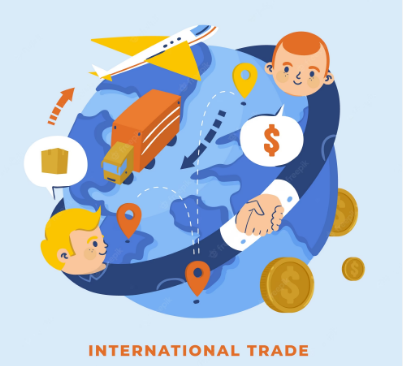International Trade is dealing in trade of commodities, services, and technology across national boundaries. It should also have a lot of information for newcomers to this industry.
What is International Service Trade?
International service trade refers to a form of trade in the input and output of services between nations. The narrow concept of international service trade refers to traditional intangible trade such as transportation, insurance, finance, and tourism that serve international trade in goods. The broad concept also includes new trade activities that have emerged in modern times. And services related to trade in goods, such as contracted labor, satellite transmission, and dissemination. International service trade can be divided into two categories: international additional services and international core services. International additional services refer to additional labor services provided for physical exports of accompanying goods. International core services are services that are purchased separately for consumers and provide them with core utility. The historical structure of the development of international service trade is unified with the logical structure of the development of international service trade. International service trade refers to the various services provided in international trade. Its purpose is to promote the development of global trade and improve the efficiency and convenience of international trade.

What is the role of International Service Trade?
The role of international service trade is very important. The following are some important roles of international service trade:
- Promoting economic growth: International service trade can create employment opportunities, increase income and profits, promote demand for goods and services, and thus promote economic growth.
- Improving production efficiency: International service trade can provide new technologies, management, and experience. Help enterprises improve production efficiency and reduce costs.
- Promoting international trade: International service trade can help multinational corporations engage in international trade, thereby promoting the development of global trade.
- Expanding consumer choices: International service trade can provide more and better services and products. Expand consumer choices and needs, thereby improving consumer welfare.
- Promoting cultural exchange: International service trade can promote cultural exchange and cooperation between different countries and regions, thereby promoting the development of cultural diversity.
International trade in services plays an important role in the development of the global economy and society.
How do you do international trade?
International trade refers to the buying and selling of goods and services in the international market, which generally requires the following steps:
- Determine trading partners: Determine trading partners engaged in trade activities in the international market, including enterprises or government agencies of the other country.
- Contact communication: Contact and communicate with trading partners to understand their needs and potential trade opportunities. Contact can be made through email, phone, trade exhibitions, and other means.
- Signing the contract: After reaching a trade agreement, sign the trade contract. Determine details such as product specifications, quantities, prices, and delivery times.
- Payment: After the delivery of goods and services, the payment shall be made in accordance with the contract.
- Goods transportation: During the transportation of goods. Ensure that the goods arrive at the destination on time and assist customers in arranging the transportation of the goods.
- After sales service: After the customer receives the goods or services. Provide after-sales service and handle issues such as returns, exchanges, or complaints.
However, international trade needs to comply with international trade regulations and standards. This includes trade agreements, customs regulations, inspections and certifications, while also considering issues such as commercial and currency risks.

What are the three types of international trade?
International trade can be classified in different ways, and the following are three common types of international trade:
- Cross border trade: Cross border trade refers to the buying and selling of goods and services between different countries. The goods and services of this trade activity cross national borders, such as imports and exports.
- Overseas trade: Overseas trade refers to the buying and selling of goods and services between countries outside the domestic market. The goods and services of this trade activity cross national borders, but are ultimately sold in another country’s market.
- Foreign trade: Foreign trade refers to the buying and selling of goods and services between the domestic and foreign markets. The goods and services of this trade activity cross national borders and can also be seen as international trade conducted outside the domestic market.
Takeaway:However, there are also some problems and challenges in international service trade. For example, some countries may adopt discriminatory measures when providing international service trade, thereby restricting the entry of service trade from other countries into the market. In addition, due to the fact that the production and consumption processes of goods and services in international service trade cross national borders. Therefore, it is necessary to comply with international service trade regulations and standards to ensure service quality and safety. In summary, international trade in services plays an important role in the development of the global economy and society. However, while realizing the potential of international service trade. Effective measures need to be taken to ensure the fairness and sustainability of service trade.
Maxtop Tech is a China sourcing company and supply chain assistance management company. Our service for buying office is help our customers to import goods from China more smoothly, more simple. more time-saving.